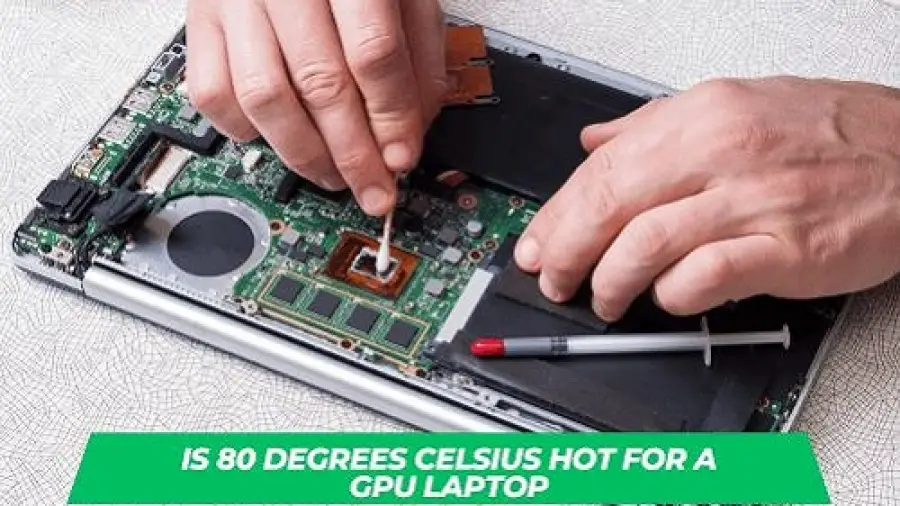Yes, 80 degrees Celsius is hot for a GPU laptop. The average maximum temperature for a laptop is between 95 and 105 degrees Fahrenheit, so 80 degrees Celsius is well above that. Laptops are not designed to operate at such high temperatures, and doing so can cause permanent damage to the internal components.
Additionally, the fan noise from a laptop running at such high temperatures can be quite loud and annoying.
Is 80 Degrees Celsius Hot For A GPU Laptop?
An operating temperature of 80 degrees Celsius for a GPU in a laptop is considered relatively high but generally within acceptable limits. Most modern GPUs can handle temperatures up to around 90-95 degrees Celsius before they start throttling or causing performance issues.
However, to ensure optimal performance and longevity, it’s advisable to keep the GPU temperature lower, if possible, by improving the laptop’s cooling or reducing the load on the GPU during intensive tasks. Regularly cleaning the laptop’s cooling system and ensuring proper ventilation can also help maintain lower temperatures for better overall performance.
Is 80 degrees Celsius hot for a GPU laptop?
A lot of people seem to think so, and while it may not be the best temperature for your laptop, it certainly isn’t the worst. GPUs can operate at high temperatures without any issues, and in fact, some laptops are designed to run at even higher temperatures.
So if your laptop is running at 80 degrees Celsius, don’t worry too much about it.
Safe PC Temperatures as Fast As Possible
Is 80 Degrees Celsius Hot for a Gpu Laptop
Yes, 80 degrees Celsius is hot for a GPU laptop. If your laptop’s graphics processing unit (GPU) is running at 80 degrees Celsius, that’s considered high. High temperature levels can cause your computer to throttle its performance to try and cool itself down, which can lead to reduced frame rates or quality in games.
Additionally, high temperatures can shorten the lifespan of your GPU.
What are the Consequences of Running a Laptop With a Gpu at 80 Degrees Celsius
If you’re running a laptop with a GPU at 80 degrees Celsius, you’re likely going to experience some pretty serious consequences. For one, your laptop is probably going to throttled down its performance in order to prevent the GPU from overheating. This means that your games and other graphics-intensive applications are going to run slower than they normally would.
Additionally, your laptop’s battery life is probably going to take a hit as well – since the battery will be working harder to keep the GPU cool. In extreme cases, running a GPU at 80 degrees Celsius can lead to hardware damage – so it’s definitely something you want to avoid.
Is 90 degrees Celsius hot for a CPU?
Is a CPU temperature of 90 degrees Celsius considered dangerous? Absolutely. It is imperative that your computer operates within the range of 80-85 degrees Celsius to prevent potential damage to the CPU.
Can Anything Be Done to Prevent a Gpu from Overheating on a Laptop
There are a few things that can be done to help prevent your GPU from overheating on your laptop. One is to make sure that you have proper ventilation for your laptop. This means making sure there is room for air to flow around the device and that the fan is able to work properly.
Another thing that can help is to ensure that you are not blocking any of the vents on the laptop, as this can restrict airflow and cause heat build-up. Additionally, it can be helpful to clean the dust out of the vents and fan regularly, as this can also impede airflow and cause overheating. Finally, you may want to consider using a cooling pad or stand for your laptop, as these can help improve airflow and keep your device cooler.
Related resources: How to turn the Regular Laptop into a Gaming Laptop?
Can You Close Your Laptop While Updating Mac?
When to Upgrade Your Gaming Laptop?
Should I Use A Gaming Laptop For College?
Conclusion
At 80 degrees Celsius, your laptop’s GPU is running at its maximum temperature. This is hot, but it’s not necessarily cause for alarm. Your laptop will likely throttle its performance to avoid overheating, so you may notice a decrease in FPS if you’re gaming or running graphics-intensive applications.
If your laptop starts to feel hot to the touch or if the fan noise becomes excessive, it’s time to take action to prevent damage.
